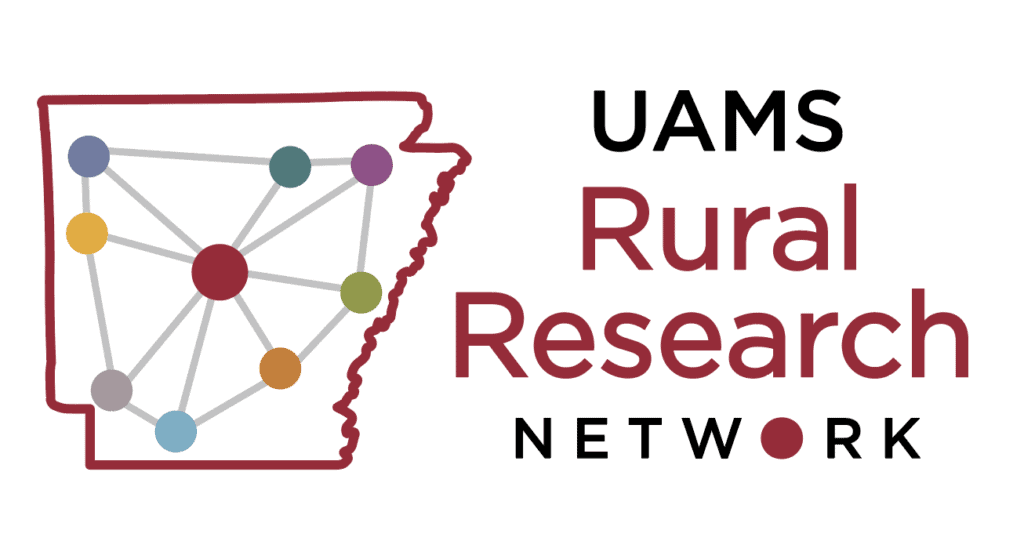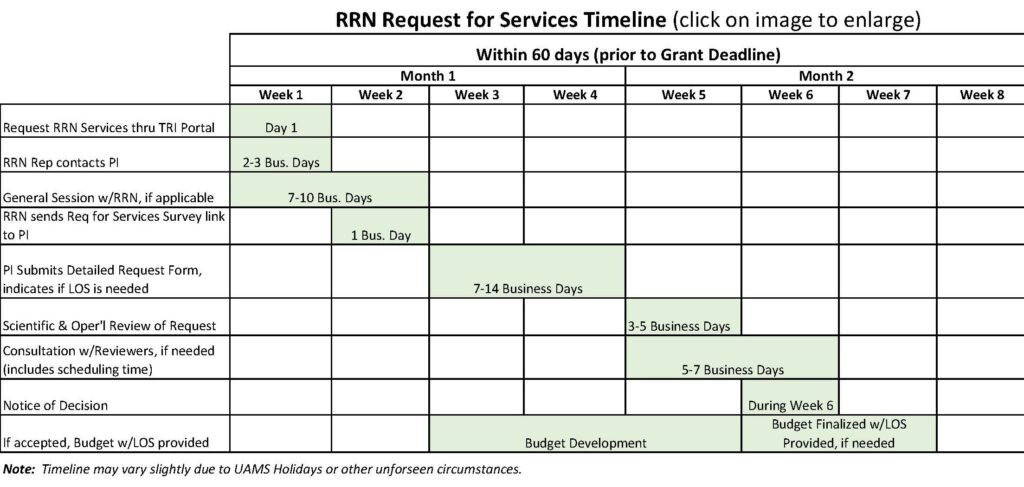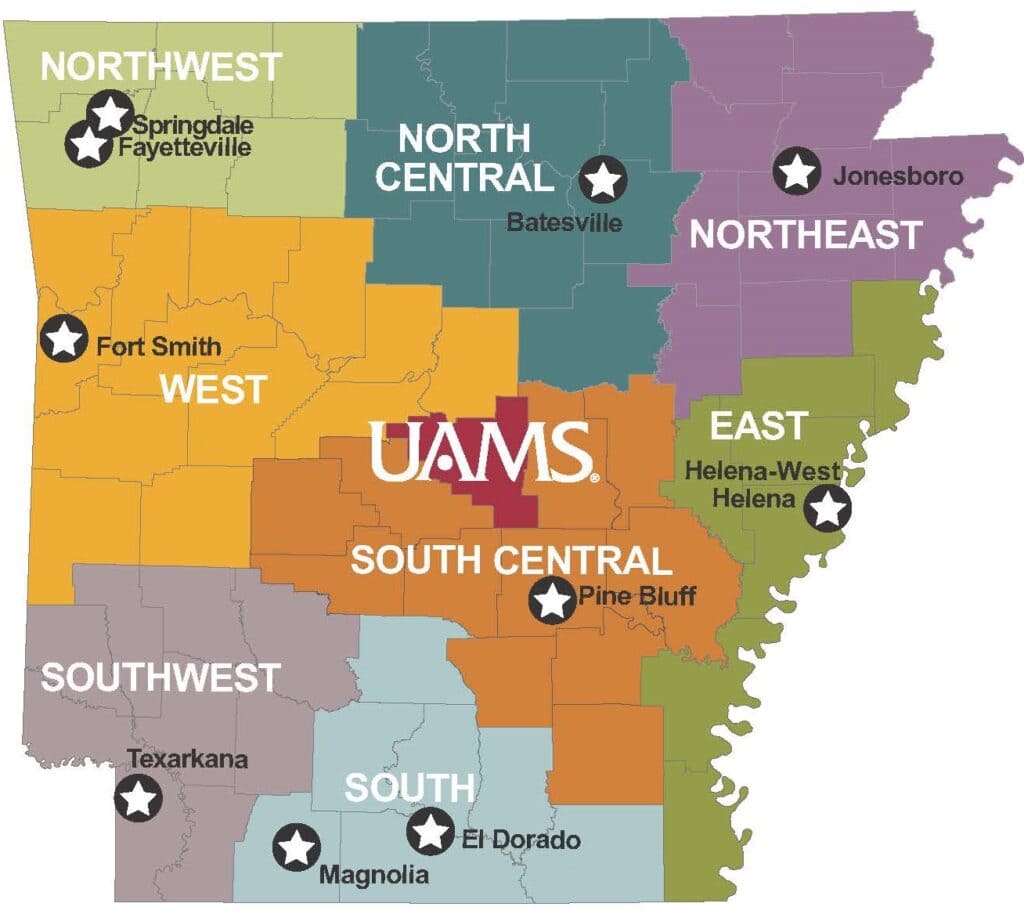
The UAMS Rural Research Network (RRN) was established in January 2020 in response to the high prevalence of health disparities and the lack of research opportunities among rural and minority communities. The RRN leverages the existing clinical and educational infrastructure of UAMS Regional Programs for research and research opportunities and to help ensure Arkansas’ rural populations have access to community health resources and are included in health research. The RRN comprises UAMS’ nine Regional Campuses across the state. The RRN is supported by an intra-institutional partnership and administered by the Translational Research Institute (TRI).
Mission of the UAMS Rural Research Network
The RRN’s mission is to improve the health of Arkansans by engaging individuals living in rural areas of Arkansas in clinical and translational research.
Statewide Intra-Institutional Partnership
The RRN provides research coordinators and research support in the nine UAMS Regional Program sites.
The RRN was formed in partnership with leading community health research entities affiliated with UAMS. Leaders from the institutes and programs collaboratively offer guidance and scientific oversight for the RRN.
The RRN is jointly supported by its partners:
- UAMS Translational Research Institute
- UAMS Winthrop P. Rockefeller Cancer Institute
- UAMS Office of Community Health & Research
- UAMS Regional Programs
Requesting Research Support Services
UAMS-affiliated faculty wishing to conduct research studies within the RRN should submit a Clinical Trial Innovation Unit Request through the TRI Services Portal at TRI.uams.edu and select Rural Research Requests and Consultations to provide more details about the proposed research.
Faculty seeking support from the RRN and/or letter of support related to a grant submission should submit a request no later than 60 days prior to the grant deadline. For example, grants with a due date of February 5, 2024, should submit an online request by December 5, 2023. The purpose of the request is to assess study feasibility, develop a draft budget for the study, and to prepare the study for review by the RRN Leadership Team.
Studies will be reviewed by the RRN Leadership Team monthly. Studies are reviewed according to their alignment with the RRN mission. At a minimum, studies performed within the RRN should do the following:
- Enroll patients that are receiving their care in the UAMS Regional Programs
- Involve collaboration with a faculty member working in UAMS Regional Programs
- Address a disease area that is of high priority to rural and/or underrepresented individuals in Arkansas due to existing high rates of morbidity and mortality, reduced access to medical care, and/or health determinants
These studies are expected to have some level of research support, such as NIH, foundation, or industry support to receive RRN support. Non-funded studies will not be supported by the RRN.

Rules of Engagement:
- Budget for use of the RRN’s research support team including the appropriate effort for the required clinical and research staff as well as supplies needed to conduct the research within Regional Programs
- Demonstrate improvement of health outcomes in a disease area of high priority to rural and/or underrepresented individuals seen in Regional Programs
- Consultation with TRI’s Biostatistics, Epidemiology, and Research Design (BERD) program with respect to design and statistical approaches
- Consultation with TRI’s Comprehensive Informatics Resource Center (CIRC) program to develop a data sharing and management plan and to obtain approval for all forms of data collection
- Provide a copy of the grant to the RRN director and upon IRB approval, access to the approved protocol
- Participate in the establishment of an MOU that outlines the roles and responsibilities of the RRN and the study PI and designees to achieve study objectives and study enrollment goals
- Provide opportunities for Regional Programs’ faculty and residents to engage in scholarly activities that are a part of the research (i.e., publications, presentations)
- Cite TRI using guidelines here: TRI.uams.edu/cite
- Acknowledge the RRN when presenting or publishing
Rural Research Network Study Sites

UAMS Regional Programs is comprised of ten community clinical centers broadly dispersed throughout Arkansas (previously known as the Area Health Education Centers [AHECs]) in Fayetteville, Springdale, Fort Smith, Jonesboro, Pine Bluff, Texarkana, Magnolia, El Dorado, Helena-West Helena, and Batesville. The Centers serve as the study sites for the RRN. Since the establishment of its initial framework, UAMS Regional Programs has grown to be a regional system of care encompassing training for nursing, pharmacy, and mid-level and allied health professionals. Each site is different, offering a variety of opportunities, resources, and access to special populations.
For additional information about Regional Programs, go to the REP 2021-2022 Annual Report.
| UAMS Regional Campus | Location | Counties Served |
| Northwest | Fayetteville and Springdale | Benton, Boone, Carroll, Madison, Newton, Washington |
| East | Helena – West Helena | Chicot, Crittenden, Desha, Lee, Monroe, Phillips, St. Francis |
| South Central | Pine Bluff | Arkansas, Cleveland, Drew, Garland, Grant, Jefferson, Hot Spring, Lincoln, Lonoke, Prairie, Saline |
| West | Fort Smith | Conway, Crawford, Faulkner, Franklin, Johnson, Logan, Montgomery, Perry, Polk, Pope, Sebastian, Yell, Scott |
| North Central | Batesville | Baxter, Cleburne, Fulton, Independence, Izard, Marion, Searcy, Sharp, Stone, White |
| Southwest | Texarkana | Clark, Hempstead, Howard, Pike, Lafayette, Little River, Miller, Nevada, Sevier |
| South | El Dorado and Magnolia | Ashley, Bradley, Calhoun, Columbia, Dallas, Ouachita, Union |
| Northeast | Jonesboro | Clay, Craighead, Cross, Greene, Jackson, Lawrence, Mississippi, Poinsett, Randolph, Woodruff |
Funding Opportunities
The Rural Research Network, in partnership with the Winthrop P. Rockefeller Cancer Institute, has established the Winthrop P. Rockefeller Cancer Institute Rural Research Award Program (RRAP) to fund pilot/feasibility studies that focus on prostate, colon, breast, and/or lung cancer; cancer patient outcomes; cancer screening and prevention; and/or cancer health disparities. To learn more, please visit the RRAP page.
The latest report from the Arkansas Central Cancer Registry, highlighting the differences in incidence and mortality between rural and urban areas, is available here.
